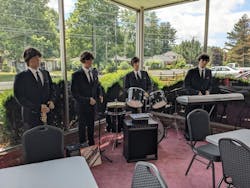How One Operator Revamped His Business Through Challenging Times
Don’t let the mannequin representations of the Beatles in the lobby of Bob Waldron’s CARSTAR shop in Lancaster, Massachusetts, fool you. Waldron has been in business for a long time, but not long enough to be contemporary with the real John, Paul, George and Ringo, nor the 1960 Chevy Bel-Air that sits feet away. Those throwbacks—and many more mid-century touches—are instead a nod to the building’s long history, existing as a car dealership decades before Waldron opened his first shop in the early 1980s.
Now entering his 41st year as a shop owner and with three other shops in operation, Waldron is anything but old-fashioned. He’s progressive in the face of challenges, and there’s been no bigger challenge than the COVID-19 pandemic. Waldron saw the perfect time to revamp his business, examine what wasn’t working and remodel for the future.
The Backstory
Waldron always knew he wanted to work with his hands. He went to a technical high school in the late 1970s with designs on being a carpenter or an auto mechanic. But he found his way into the auto body department and bought his first shop in 1981 just two years after graduating from school.
Along the way Waldron became one of the original franchise partners in the CARSTAR network in 1989 and soon had a four-shop operation. Business was good, but Waldron admits that it was almost too good. Until 2020 rolled along, there wasn’t much need to change things up.
“Being in business at the time of the pandemic was, you know, 30 plus years and let's face it, you do start to get in your comfort zone,” Waldron says now. “I can see new equipment, see new processes and so forth, but you start to, I'm just being honest, you just start to coast a little bit. Well, Mr. COVID had other plans for us. So, we're no longer coasting.”
The Problem
Like much of the world, Waldron was caught off-guard when the pandemic hit in March 2020. At first not expecting much meaningful disruption to day-to-day operations, Waldron soon realized the effects would be wide-ranging. His business had to fight all the same battles as everyone else and tread water just to survive.
Once the short-term shock wore off, Waldron sensed there would be long-term impacts. The first one that became apparent was staffing and getting people back to work. The way people worked had changed and business owners everywhere were trying to get a handle on it.
Within that challenge Waldron saw an opportunity.
“Most people, even today, you know, want to hunker down and wait for the storm to pass,” Waldron says. “And I was just never built that way. So I said, you know what, people are going to have to rebuild their business eventually. But if they do it at the end of the storm, and I do it during the storm, I think I'll be that much ahead.”
The Solution
Waldron already had a part-time human resources employee to go to for help in solving HR matters. Problem was, he lived in Connecticut and during the pandemic was unable to travel to Massachusetts. But there was plenty of work to be done, so he and Waldron worked together remotely for roughly a year. Then once he was able to be in person again, Waldron asked him to work full time for three months, and then another three months, before ultimately hiring him to be the company’s chief operating officer.
“The more that we started digging, the more we found that needed attention,” Waldron says. “And the more I got results from the more energy I continued to create.”
As has been proven with the human resources challenges gripping the industry in recent years, Waldron identified that employee retention and recruitment were going to be ongoing problems. They increased pay, offered signing bonuses and revamped incentive plans to be even more attractive to employees. They aggressively marketed open positions and offered referrals to bring in more qualified employees.
The methods worked, and they had to. Many employees left due to both pandemic reasons and not, resulting in a total turnover of more than 40 employees within the span of a year. The churn was manageable due to the new processes the shop also enacted. Suddenly all the new employees came in all on the same page because they learned the same processes.
“We've had to do a higher level of coaching the managers to get the new message across more now than ever, and to have them believe in the system as well, that things were going to change,” Waldron says. “So we've spent more time coaching, mentoring, you know, our management staff, and having them believe in this.”
The Aftermath
Those new processes included re-writing job descriptions and task lists to make each role as efficient as possible. Waldron also hired an in-house trainer to raise up the quality of the technicians already in the building. Also added to the team was a marketing manager and an appraiser working remotely, allowing him to service any of the four locations and also assist with training. Waldron reports it is rare that any shop needs to be fully staffed in-person.
But not all the changes were personnel related. During the heart of the pandemic when there was ample downtime, Waldron made improvements to the shops with new equipment, giving the buildings and vehicles a good cleaning and, last but not least, improving the customer experience—hence the Fab Four.
“We’ve got the four of them, I’m looking at them right now and we get more comments on these four that when people walk into the showroom and say, ‘Oh, sorry, I didn’t want to interrupt the meeting,” Waldron jokes. “They look over and, I mean the people that have the comments are just priceless.”
With the house band, a space the size of a showroom floor and an old-fashioned Coca-Cola machine fully stocked with soda in glass bottles, the shop is available to rent for community members looking to host a meeting.
“You stroll down memory lane for a little bit,” Waldron says. "… And it really goes a long way. You get away from reality for a couple, three hours.”
The Takeaway
With the worst of the pandemic apparently in the rear view, Waldron, his four shops and his team of more than 50 employees are still here. Not everything has gone according to schedule; plans pre-COVID to acquire additional locations have had to be put on pause. But overall the operation is still thriving as Waldron celebrated his 40th anniversary of the business last year. The industry veteran is quick to credit his team members for adapting to the new processes and helping the business bounce back.
“I sit here and talk to you, and I'll get my picture in the paper, and I'll get quoted on a few things,” Waldron says. “But, I'm not out back writing estimates or painting cars or doing any of the QC sheets or anything, you know, it's all people. So if you don't have the right team, you can have all the systems in place, but you don't have the people that use them or to implement them, then it's just not going to work.”
About the Author
Todd Kortemeier
Todd Kortemeier is former editor of FenderBender magazine and started writing as a contributor in 2024.

